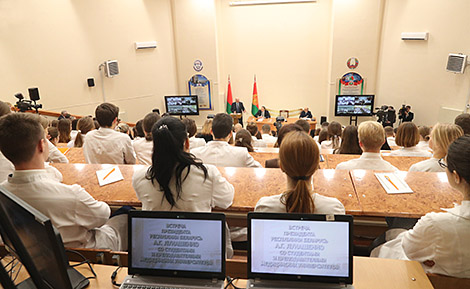Events
Belarus president talks about nationwide shortage of medics

MINSK, 13 December (BelTA) – Ministries should pay close attention to making sure universities train the necessary number of professionals with necessary specializations taking into account needs of every region. Belarus President Aleksandr Lukashenko made the statement as he met with students and professors of medical universities on 13 December, BelTA has learned.
Aleksandr Lukashenko said: “I’ve been asked repeatedly about the shortage of medical personnel in the country. When there was a surplus of medics in the past, the number of students admitted to medical universities was reduced virtually by one third. Respectively the number of graduates dropped. Today state-sponsored admission to these universities has been increased by 200 people. The percentage of students getting employer-sponsored education is at its maximum.”
The president stressed that in the future the relevant ministries should pay close attention to making sure universities train the necessary number of specialists and decisions have to be made taking into account current needs and development plans of every region. “Don’t forget about foreigners. They want to study in Belarus. Their countries pay huge amounts of money for Belarusian education,” he added.
According to Aleksandr Lukashenko, the current medical education system in Belarus represents an amalgamation of rich traditions, a solid scientific foundation, and huge practical experience. A custom-tailored approach to every student is practiced. This approach coupled with high teaching standards, including instruction in foreign languages, have secured decent international rankings of Belarusian medical universities. At present over 20,000 students go to these universities, including over 4,000 students from 71 countries. The volume of educational services exported by the Healthcare Ministry system rises every year and accounts for one third of the country’s educational services. “However, we cannot rest on our laurels. We have to grow,” Aleksandr Lukashenko said.


 The head of state mentioned that one of the main problems raised by graduates of medical universities among other people is the high level of academic training and insufficient mastery of the practical skills the future profession requires. “I am deeply convinced that in order to train a skilled medic, it is necessary to combine classic teaching techniques and cutting-edge education technologies,” Aleksandr Lukashenko said.
The head of state mentioned that one of the main problems raised by graduates of medical universities among other people is the high level of academic training and insufficient mastery of the practical skills the future profession requires. “I am deeply convinced that in order to train a skilled medic, it is necessary to combine classic teaching techniques and cutting-edge education technologies,” Aleksandr Lukashenko said.
Aleksandr Lukashenko noted that the Belarusian medical education system has been modernized in the last few years. A practice-oriented education system has been created. “We’ve mastered new education and information technologies: digital academic performance records, modern patient imitators, software and hardware to allow medical students to practice their skills without risking the life of real patients. Such simulators help students and interns improve their skills faster,” the head of state said. This is why it is necessary to continue equipping practical education centers with cutting-edge tools. On the whole, Belarusian medical universities need state-of-the-art physical infrastructure, he added.
“I’ve repeatedly stated it is necessary to integrate education, science, and practical work. The problem has been resolved abroad by means of establishing teaching hospitals. Their effectiveness is confirmed by the experience of many Western European countries,” Aleksandr Lukashenko noted.
The Healthcare Ministry is now working on a pilot project to create a teaching hospital based on the Grodno Oblast Clinical Hospital. “We expect that the creation of a new format of interaction between practical healthcare and education will help secure more active participation of practicing physicians in the educational process and more effective use of the potential of university professors,” Aleksandr Lukashenko said. “Professors fit the bill. I understand they are very smart guys. I even ask for their advice and proposals. But you understand the qualities of practicing physicians, who deal with patients every day. Meanwhile, professors in a university may be a bit too detached from the process. So there are advantages and drawbacks in practicing physicians. The same can be said about professors. By combining it, students will get what they need.”
The head of state believes that this first experience will help the Belarusian medical education system to not only expand the scope of the education process but combine material resources, human resources, and scientific resources. It is the right way towards raising the effectiveness and quality of medical aid available to all residents of the country.







 print version
print version make home page
make home page add to bookmarks
add to bookmarks

